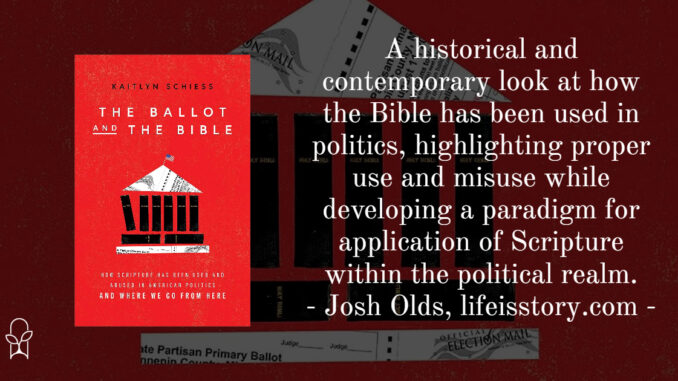
Also by this author: The Liturgy of Politics
Published by Brazos Press on August 22, 2023
Genres: Non-Fiction, Christian Life
Buy on Amazon
Goodreads

How do Bible passages written thousands of years ago apply to politics today? What can we learn from America's history of using the Bible in politics? How can we converse with people whose views differ from our own?
In The Ballot and the Bible, Kaitlyn Schiess explores these questions and more. She unpacks examples of how Americans have connected the Bible to politics in the past, highlighting times it was applied well and times it was egregiously misused.
Schiess combines American political history and biblical interpretation to help readers faithfully read Scripture, talk with others about it, and apply it to contemporary political issues--and to their lives. Rather than prescribing what readers should think about specific hot-button issues, Schiess outlines core biblical themes around power, allegiance, national identity, and more.
Readers will be encouraged to pursue a biblical basis for their political engagement with compassion and confidence.
There’s an image that stands out to me when I think of how Scripture has been weaponized and misused in American politics: It’s then-President Donald Trump, stern-faced, holding a Bible in front of St. John’s Church on Lafayette Square. The area had been filled with protestors lamenting the murder of George Floyd and calling for justice. Police pepper sprayed protestors and used other riot control tactics to clear the area for the photo op. But this misuse of Scripture isn’t partisan. Current President Joe Biden invoked the words of Isaiah, responding to God’ call to be a prophet to honor soldiers in war. Pretty much every politician in any party has used Scripture—not for the purposes of honoring Scripture, but for advancing their own agenda. That is the power of the Bible.
The Ballot and the Bible is a historical and contemporary look at how the Bible has been used in politics, highlighting proper use and misuse while developing a paradigm for proper application of Scripture in the political realm. The author, Kaitlyn Schiess, is a public theologian with an interest in politics. Her previous book, The Liturgy of Politics, explored politics as spiritual formation. She’s currently engaged in doctoral work in political theology at Duke. This topic is her passion and that fervor exudes on every page.
Schiess begins The Ballot and the Bible by calling America a “Bible-haunted nation” and explores the legacy of political biblical interpretation. She starts with the Puritans, shifts to an exploration of Romans 13, talks about slavery, moves into a discussion of social justice, capitalism, apocalyptism, and the list goes on. What Schiess is able to do is show how both the use and misuse of Scripture permeates virtually every facet of American political and social life. This movement is somewhat chronological, moving from Puritans to the Revolution to the Civil War, to the Social Justice movement of the early 1900s, to Reaganomics, to Left Behind fervor. However, this is not a historical work. Rather, Schiess uses these historical movements to show how these misuses have always been around in some form or another—and still exist today.
The final chapters of the book move into the use of Scripture during the Obama and Trump years and a general look at the political theology of Jeremiah 29—the chapter where God says he “knows the plans he has for you”—and how that chapter has been co-opted into speaking to modern America and not ancient Israel. If I had one complaint with The Ballot and the Bible, it’s that I wanted more.
Schiess’s book is written with such a broad scope that it, by necessity, has to only give a quick glance at each issue. For me, that meant that there was nothing really new or outstanding in it. For someone less involved in politics, it might be more eye-opening. Schiess also writes with the goal of being very moderate. Her tone is irenic and straightforward—more of a historian than a prophet. That’s a purposeful choice, but I think it leaves the book feeling a bit toothless at points. But maybe I’m just not as nice as Schiess.
Overall, I believe The Ballot and the Bible is an important work. Schiess very clearly sets out how Christianity has influenced American political life since its inception. What the book does not do—and again, I think this is purposeful—is engage in the apologetical argumentation that would help readers define “use” and “misuse.” Because that’s really the question, isn’t it? Very few (it would be naïve to think nobody) believe they are misusing Scripture when they invoke it for political purposes. Many people (more so than politicians) often genuinely believe that a proper application of Scripture fits their political outworking. So what are we to do then? The final part of the book’s subtitle is “And where do we go from here?” That’s the question The Ballot and the Bible doesn’t answer adequately. And you know, it’s a difficult question. I look forward to Schiess continuing her work and exploring these questions.
